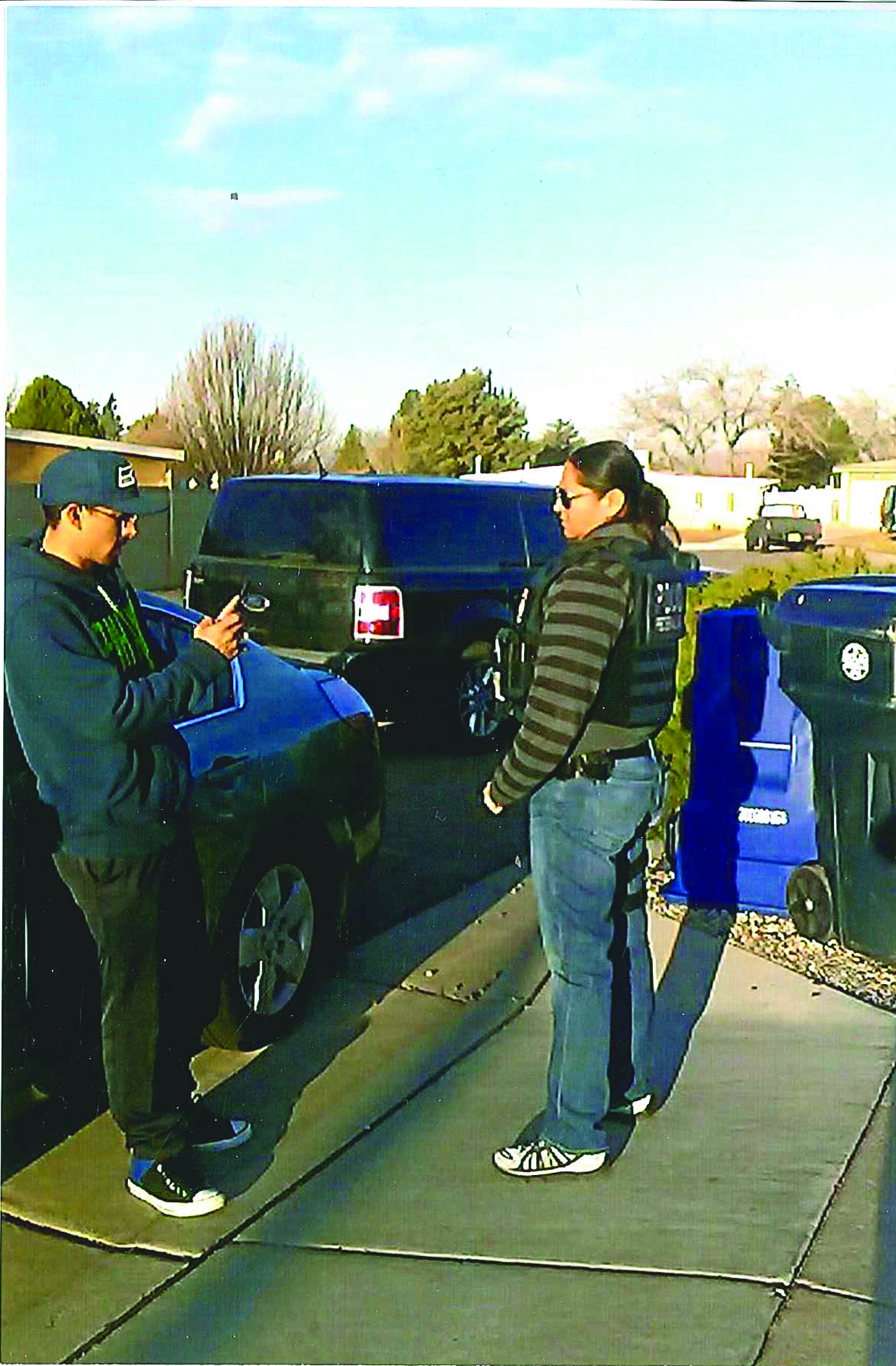The knock on the door came at 6 in the morning. Michelle and Francisco Chavez jolted awake in the early morning hours, and could see flashing lights outside their bedroom window of their Albuquerque home.
“My first reaction was that there must be a bad guy in the neighborhood or something,” remembers Michelle. “His first reaction was that it was immigration.”
Michelle opened the front door, leaving the wrought iron security door closed between her and the two officers standing on her front stoop. They were both dressed in civilian clothes and black tactical vests with the word “Police” emblazoned on the back. They identified themselves as “officers” and said they were looking for Francisco.
“I noticed that one of the officers was wearing bright green tennis shoes,” said Michelle. “I thought, ‘what kind of police wears bright green tennis shoes?’ I asked who they worked for but they wouldn’t say. They just said that they were ‘officers.’”
The two agents, who Michelle would later learn were from the federal Immigration and Customs Enforcement (ICE) agency, insisted that they needed to speak to Francisco and showed her an administrative warrant that authorized them to pick him up. Frightened, but determined to protect her husband’s rights, Michelle refused to allow them in their home and insisted that they could not speak to her husband until he had legal representation. She then closed the door, and waited for the officers to leave.
Nearly a citizen, nearly deported
Michelle, a U.S. Citizen who works as a waitress, and Francisco, a retired auto-technician originally from Guadalajara, Mexico, have been married now for 30 years.
“We met at a Christmas party,” said Michelle. “We had a couple beers, had a couple dances and have been together ever since. He’s my everything. He taught me how to watch soccer, I taught him to watch Wheel of Fortune. He taught me how to make tacos, I taught him how to make spaghetti. We both support and care for each other.”
Francisco obtained his legal permanent residency in 1989 shortly after they married, and they have a son named Tomás, who now has two children of his own. Due to a work-related injury and chronic health issues, Francisco no longer works and spends most of his time with his grandchildren. Michelle and Francisco are especially fond of taking them on trips to the Albuquerque zoo, playing in the park, and going with them to the library near their house. They’re typical proud grandparents, quick on the draw with stacks of photos of their grandkids.
But the future of their happy life together is now in danger due to one mistake Francisco made 25 years ago.
In 1992, Francisco was arrested on felony drug possession charges and served a 90-day sentence and probation as a result. But even though he has already paid his debt to society and hasn’t had so much as a speeding ticket since then, this conviction has returned to haunt him and his family.
Based upon Francisco’s long-time legal residency in the United States, he is eligible for naturalization and submitted an application to become a U.S. citizen while President Obama was still in office. Though President Obama’s administration deported more people than any other previous administration, he directed ICE to prioritize foreign nationals with serious criminal records. He further directed immigration agencies to exercise discretion when deciding whether to allow persons like Francisco, who was guilty of nothing more serious than a single non-violent offense decades earlier, to naturalize to become a U.S. citizens rather than seeking to deport them.
Under Trump’s directives, disabled grandpas like Francisco are now top priority.
However, when President Trump took office in January he issued a series of sweeping executive orders targeting immigrants and threw discretion out the window. ICE is now under orders to aggressively pursue deportation of so-called “criminal aliens,” the majority of whom have committed only minor offenses. According to a report by the Washington Post, nearly half of the 675 immigrants rounded up in the first days of the Trump presidency either had no criminal record or had committed traffic offenses. Under Trump’s directives, disabled grandpas like Francisco are now top priority.
This all puts Francisco in a unique position: his marriage to a U.S. Citizen and longtime legal residency in the United States make him eligible to become a naturalized citizen, but simultaneously his felony conviction makes him deportable under the Immigration and Nationality Act. He has a pending application for citizenship and immigration agents knocking on his door trying to place him into deportation proceedings.
Tailed through the streets
After the agents left the Chavez’s house that day, Michelle called her son Tomás in a panic.
“I get a call at six in the morning while I’m cooking breakfast, and it’s my mom,” Tomás recalls. “She tells me that the police are trying to arrest your dad, and I’m like ‘Why?’ What has he done wrong?’”
Tomás rushed over to his parents’ house to calm his parents down, and after discussing the situation they agreed to meet at a nearby restaurant for breakfast. As they got into their cars and drove out of their neighborhood, they noticed a Ford Flex with out of state plates pull out of a neighbor’s driveway and start tailing Francisco.
“Now they’re following us around in an unmarked car that has Texas license plates on it,” said Tomás. “At this point we don’t even know if they’re real law enforcement because they won’t identify themselves. What else are we supposed to do, except say, I’m gonna protect my rights and try to figure this situation out.”
After a quick phone call, Tomás and Francisco rerouted to Tomás’s house where he parked in his son’s driveway and ran inside. The same two ICE agents emerged from the tail vehicle and once more confronted Michelle and Tomás, demanding to speak with Francisco. Michelle and Tomás again refused to allow them inside their house or let Francisco speak to them without legal representation, and Tomás pulled out his cell phone to begin recording the interaction. Sensing their window of opportunity had closed, the agents climbed into their SUV and left.
After they were certain that the agents had left for good, Michelle began trying to figure out what to do next.
“I just remember thinking, ‘The ACLU helps people. The ACLU helps balance the system out."
“I just remember thinking, ‘The ACLU helps people. The ACLU helps balance the system out. So we drove over to the ACLU’s office in Albuquerque,” Michelle recalls, laughing. “The water delivery guy was coming out just as we came to the door so I stuck my head in and said “Please help me!”
ACLU of New Mexico staff sat down with Michelle and Francisco to help navigate the situation and connect them to a local immigration law firm.
“The Chavez’s did exactly the right things to protect their rights,” said ACLU of New Mexico Staff Attorney Maria Martinez Sanchez. “They didn’t allow the agents inside their home without a warrant signed by a judge, which is very different than a simple ICE administrative warrant. As soon as they were contacted by ICE, they refused to speak to federal agents and then immediately sought out legal representation. If Francisco hadn’t exercised his rights that day, he would have likely been placed into deportation proceedings.”
The family’s attorney has since contacted ICE and they have agreed to refrain from taking Francisco into custody until his citizenship application is resolved. While the immediate threat has passed, their future remains uncertain.
“They have all the power,” said Michelle. “They have the power in their hands and we have the hope in our hearts. It’s hard to plan for the future, when you don’t know if you have a future. People ask me, ‘what are you going to do if he gets deported? ‘ I say I don’t know. We pay the mortgage together. We cook meals together. We support each other. How do you have a marriage if you live in two different countries?”
A Climate of Fear
Unfortunately, the fear and uncertainty that Michelle and Francisco feel under President Trump’s new immigration enforcement policies is shared by millions of families across the country. An estimated 12 million undocumented people currently live in the United States, many of whom have spouses or children who are U.S. Citizens. As Francisco’s case shows, even longtime legal residents can be at risk for being torn away from their families if something in their past triggers the interest of federal agents.
With the new administration in the process of hiring thousands of new Border Patrol and ICE agents, even scrapping the polygraph test requirement for new recruits and lowering hiring standards for new agents, President Trump appears poised to make good on his campaign promise to create a mass “deportation force.” It is likely that things are going to get a whole lot worse before they get better.
“It’s more important now than ever that people understand their rights when interacting with federal immigration agents."
“We need to be ready for this new reality,” said ACLU-NM Regional Center for Border Rights (RCBR) director Vicki Gaubeca. “It’s more important now than ever that people understand their rights when interacting with federal immigration agents. That’s why the ACLU of New Mexico has been putting a tremendous amount of effort into reaching out to immigrant and border communities and gathering the resources we need to hold this administration accountable.”
In preparation for defending the rights of immigrant families, the ACLU of New Mexico has hired a new attorney to focus on immigrants’ rights issues here in New Mexico. ACLU staff from the main office and the Regional Center for Border Rights continue to provide “Know Your Rights” trainings to community groups, and distributing Know Your Rights materials to local activists.
“We want to make sure that every New Mexican can protect their rights as well as Michelle and Francisco did,” said Gaubeca. “Moving forward, it is going to be more important than it’s ever been.”

